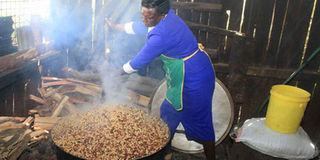Premium
Monotony of eating ugali and githeri in high school

A cook uses firewood to prepare lunch at Naromoru Township Primary School in Nyeri County on June 27, 2016.
What you need to know:
- Lunch was always githeri (a mixture of beans and maize) from Monday to Sunday.
- I must admit that I loved it because in spite of the weevils that often floated in the soup, it was the tastiest dish we got.
I did not have the fortune of going to one of those boarding schools where they serve students sausages and bacon for breakfast, or those that have snack and beverage–vending machines outside classrooms.
No, mine was a no-frills school. Breakfast was a cup of transparent tea. I say transparent because the tea was mostly water, with a dot of milk to give it some character.
We only ate bread on Saturdays, and if you made the mistake of reaching the dining hall five seconds after the breakfast bell rang, you would find your chunk of bread gone.
And when we took a 30-minute break at 10am, we were served black coffee. Not coffee coffee, but a brand called Kahawa No 1, whose residues would settle heavily at the bottom of the cup.
The only saving grace was that the cooks were generous with the sugar.
Lunch was always githeri (a mixture of beans and maize) from Monday to Sunday. I must admit that I loved it because in spite of the weevils that often floated in the soup, it was the tastiest dish we got.
Supper was ugali and cabbage, the highlight of the week being Monday and Wednesday, when they included a complementary piece of meat. For supper on Sundays, we would be served a “special” of ugali-like rice and watery cabbage. I hated it.
Home-cooked meals
As a rule, supper was served at 6pm on the dot, and thereafter, we would go for evening studies, which ended at the ungodly hour of 10.30pm. My brain usually switched off at 8pm, and so I spent the extra one-and-a-half hours blissfully napping on my desk, instead of revising, as was expected.
But we were talking about food. I am told that when I was young, I detested it.
I had to be forced, threatened, and cajoled to take a few spoonfuls. Photographs of a skeletal younger me are proof of this aversion to food. But this quickly changed once I checked into high school and discovered scarcity.
The food we were given was never enough, and every mealtime, I gobbled up every morsel on my plate, stopping short of licking it, acutely aware that my next meal would be many hours away, and would not be anywhere near filling.
As you can imagine, we all looked forward to visiting days, when our families were allowed to bring us home-cooked meals and whatever else they thought would make us happy. That day, I would stuff myself to near-bursting, and then have a stomachache-cum-running stomach that had me gritting my teeth for an entire week. But, for a taste of home, all that discomfort was worth it – at least that is what I convinced myself.
Interestingly, even after all that monotony of eating githeri and ugali daily for four years, these two dishes are my favourites.
In fact, if I had my way, the only food we would eat at home is githeri, minus the weevils of course, and ugali. It is strange, because most of the friends I went to high school with cannot stand githeri – they tell me the four years they had to put up with it were enough.
The writer is editor, Society & Magazines, Daily Nation. Email: cnjunge@ ke.nationmedia.com





